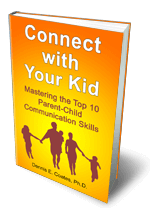In his classic parenting book, The Wonder of Boys, psychologist Michael Gurian claims that “three families – not one” are needed to raise a healthy child to be a happy, successful adult. The first family is the “nuclear family”—the parents and grandparents who raise the child. The second family is the “extended family”—teachers, coaches, relatives, caretakers and other adult mentors. The third family is the surrounding culture and community—media, churches, government and other institutions. He makes the case that raising a teenager to be a strong adult takes so much effort that most moms and dads simply can’t do it all. This has always been so, but today both parents may be working; modern life is more complex than it used to be; new media present new risks; and at a time when kids need guidance the most, they’re spending much more time away from home than with their parents.
Of course, the traditional “tribe” or “village” is no longer a typical part of modern culture. In our mobile society, grown children often move away to create lives far from where they grew up. They may move many times, and their own children may be growing up in a community of strangers.
Furthermore, many nuclear families these days are headed by single parents. This is especially tricky when the single parent is trying to raise a child of the opposite sex. Moms have never been boys, and dads have never been girls, so they may not fully understand what their child needs.
Today, caring parents attempt to create a modern-day version of the village by getting their kids involved in programs that will put them in contact with teachers, athletic coaches, counselors, ministers and other youth program leaders, adults who parents hope will help their adolescent child grow up strong for life.
The potential for a positive impact is real and significant. The classroom, sports, work, and other youth programs can demand that a young person acquires specialized knowledge and skills, deal with difficult challenges, strive against adversity, and work well with others. Like sharpening an ax against a grindstone, teens can become stronger by dealing with life’s inherent challenges. With the facilitation of a skilled mentor, the child’s efforts can lead to building aspects of character strength such as composure, cooperation, commitment, compassion, effort, excellence, initiative, integrity, perseverance, responsibility, self-confidence, and self-discipline. These are the kinds of strengths that will help young women and men succeed in school, university and later in work and life.
But there’s a problem.
For nearly 40 years I’ve been delivering training programs, assessment tools, and learning systems to millions of working adults, the kinds of adults who will comprise this modern-day village; and what I’ve learned is that few of these adults have the kind of communication skills that are essential to effective mentoring. They’re not very good listeners. They aren’t practiced in the skills of dialogue. They don’t know the best way to give feedback, whether positive or negative. And they don’t know how to coach someone to transform a life experience into a life lesson.
These deficiencies are not the fault of the adults. When we were growing up and learning how to deal with each other, we weren’t taught effective communication skills. While these are probably the most important skills a person can learn, the irony is that they’ve never been a part of anyone’s formal education. The assumption has always been that people learn how to interact through normal socialization. The idea hasn’t caught on generally that there are ideal ways to communicate, that there quite a few interpersonal skills that can help people interact well with each other — skills that can be taught.
Those of us who were lucky enough to have had training in these skills or to have had excellent role models while growing up may have acquired a few effective communication skills, and these abilities no doubt helped us succeed. But these are exceptions. Most of us grow up with communication habits that make relationships difficult.
The problem is that the ability to engage with young people is crucial to the effectiveness of an adult mentor.
Communication skills matter.
Most people mistakenly believe they are good listeners. The goal of listening is to “get the message,” to understand exactly what the speaker is trying to say. Most people don’t even realize when a “listening moment” is happening, because they think they’re involved in conversation, which is quite different from listening. They might be doing something else at the time and not give the speaker full attention. Or they might do more talking than listening in order to share their own stories and opinions. They might even interrupt the speaker to get their own points across.
When adult mentors fail to listen well, they can misunderstand what a young person is trying to say. During adolescence, most kids are seeking greater independence, pushing away from their families and other adults. When they try to connect with an adult and they get the feeling that they haven’t been heard, most of them will feel disrespected and misunderstood, and they’ll stop trying.
Another key mentor-youth communication skill is the ability to guide learning, a powerful skill that most adults have never heard of.
When it comes to teaching skills and techniques, a good approach is instruction, followed by demonstration, then lots of practice and coaching. To convey concepts and knowledge, lectures are often effective. However, neither of these approaches works well at all when teaching life lessons. When most adults spot a learning opportunity, their instinct is to lecture, to make sure the lesson is made clear.
The problem is that young people don’t react well to lectures. Even if they know the adult means well and is right, they don’t like being preached to. The lesson belongs to the adult but not to the child, and it can be perceived as a put-down. Teens may endure the lecture in silence, discounting what they’ve been told.
A better method is to ask open-ended questions that guide the boy to discover the lesson:
- “What happened?”
- “Why do you think it happened that way?”
- “What were the consequences?”
- “What do you think is a better way to handle that situation?”
Most adults aren’t familiar with this way of transforming life experiences into life lessons; but when it comes to helping boys grow stronger, it’s practically the only approach that works.
Other important mentor-youth communication skills include giving feedback, giving encouragement, dialogue and resolving conflict.
Few adults have mastered any of these best practices, and I’ve never met an adult who was good at all of them.
And yet, the adults in a child’s life want to have a positive impact. They’re doing the best they can, but typically they aren’t conscious of issues about the way they communicate. Even if they were, they wouldn’t know what to do about it. They may not appreciate that improving only a few specific skills can make a world of difference.
One of the difficulties I’ve encountered in my years working with adults is that improving skills like these takes much more than watching a video or reading about it in a book. A line from “The Matrix,” one of my favorite movies, comes to mind: “There’s a difference between knowing the path and walking the path.” Changing a long-ingrained behavior pattern takes a long-term program of modeling, reinforcement, feedback, and encouragement. Like an athlete working on skills, the adult has to “do the reps.” The reason is that when it comes to interacting, adults don’t consciously decide how they’ll communicate. They do what we all do: they react out of habit. They have to wire their brains for new habits of communicating.
My current focus on youth has led me to create Strong for Parenting and Strong for Mentoring Youth, brain-based, online coaching systems for developing communication skills and personal strengths. Anyone who wants to know how these programs work can follow the links.
 More truth-telling about adult-teen communication.
More truth-telling about adult-teen communication.
My how-to book on communicating to young people: Connect with Your Kid: Mastering the Top 10 Parent-Child Communication Skills.
You can grow the bond with your child through better listening. Download the FREE ebook, Listening to Understand.

